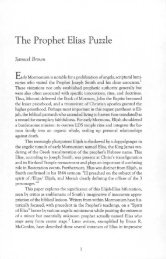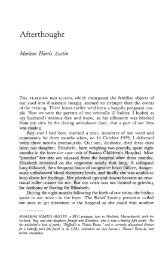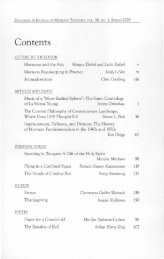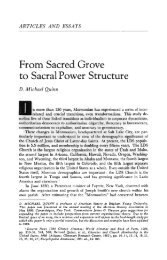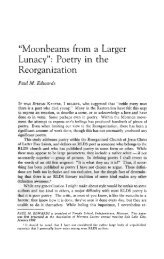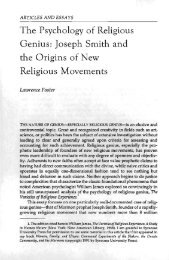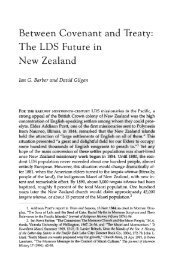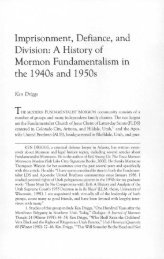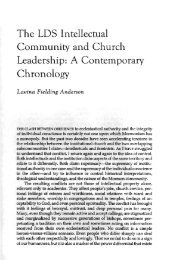Dialogue, Volume 25, Number 2 - Dialogue – A Journal of Mormon ...
Dialogue, Volume 25, Number 2 - Dialogue – A Journal of Mormon ...
Dialogue, Volume 25, Number 2 - Dialogue – A Journal of Mormon ...
You also want an ePaper? Increase the reach of your titles
YUMPU automatically turns print PDFs into web optimized ePapers that Google loves.
Lamb-Kwon: Because I Was a Sister Missionary 139<br />
mission president in numerous ways and were examples to all the<br />
other missionaries. By and large, the A.P.s I knew deserved the respect<br />
they received.<br />
In the M.T.C. and in most missions, sisters served as senior companions<br />
and trainers, but elders held all other leadership positions. I<br />
don't know whether this was a directive from above or simply tradition.<br />
I do know, as a result <strong>of</strong> subsequent experience, that it can be<br />
different, but it usually isn't.<br />
My experience with my district in the M.T.C. was a very positive<br />
one. We grew very close and generally worked well together. All eight<br />
<strong>of</strong> us were going to German missions, the elders to Hamburg, and we<br />
sisters to Munich. The elders valued us sisters and learned to appreciate<br />
the qualities we brought to the district. One day after my companion<br />
and I had been sick and had stayed in our room, the elders<br />
told us how much they appreciated our usual quieting effect on them.<br />
While we were gone, they had messed around so much that they had<br />
gotten little accomplished. They appreciated our femaleness and the<br />
influence it had on the group.<br />
Though the elders may have been partial to women anyway, my<br />
companion and I earned the respect that they gave us. Our teacher at<br />
the M.T.C. challenged our district to memorize all <strong>of</strong> the discussions<br />
before we left for Germany, a feat not <strong>of</strong>ten accomplished by an entire<br />
district. But we did it. We competed with one another to be the first to<br />
pass <strong>of</strong>f a discussion after we had memorized it. My companion and I<br />
were always among the first four to finish. The elders jockeyed back<br />
and forth for the other two positions.<br />
My companion was very smart. Though she was the only one in<br />
our district who had never studied German, she memorized the discussions<br />
as quickly as anyone — usually more quickly. Our teacher<br />
confided to me that she was the only sister missionary he had met who<br />
didn't have problems <strong>of</strong> some sort. At the time, I thought that he was<br />
complimenting both <strong>of</strong> us. Later I realized he hadn't included me in<br />
his observation. As I've since thought about his comment, I've decided<br />
that it is a key to many <strong>of</strong> the challenges sister missionaries face.<br />
Although attitudes toward women going on missions seem to have<br />
changed in the last ten years, I believe sister missionaries still encounter<br />
many <strong>of</strong> the same problems.<br />
I think our teacher admired my companion because she was so<br />
unlike the stereotype <strong>of</strong> a sister missionary. She was sinewy and athletic,<br />
although not masculine. Mostly she just didn't think like a female.<br />
She valued thought over feeling, analysis over instinct. As I think <strong>of</strong><br />
it, though our teacher thought she had no problems, she was a real<br />
pain during the hour <strong>of</strong> physical recreation for the sister missionaries.








